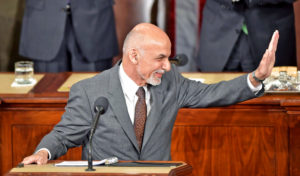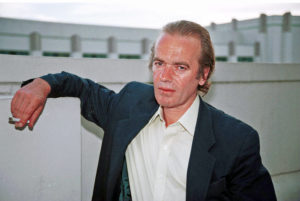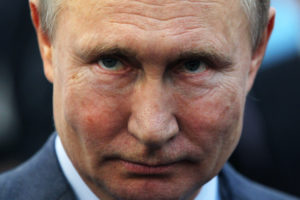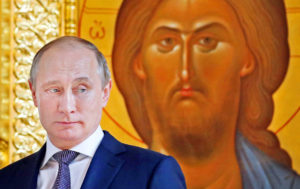The absurdly long table Vladimir Putin sits at, whether with Emmanuel Macron last month, or his terrified subordinates now, was the giveaway. There is stately furniture, then there is 20 feet of thuddingly symbolic paranoia. Isolated during the pandemic, padlocked in a “health bubble”, reading far too much history, writing (at length) zany polemic, Putin is no longer a dictator. He is a despot.
Making colleagues nod and bootlick when they have no desire to do so is the essence of power. But the despot feels the need for this sham acknowledgment not to demonstrate strength. At root he is irritable, morbid, totally oversensitive. Watching sycophants crawl along marble floors confirms his deep suspicion: human beings are low creatures. This confirmation makes him feel better.
Imagine we are allowed to send one writer into the Kremlin, with the intention of translating its walls and turrets and atavisms into literature. I’d choose Ryszard Kapuściński for the assignment. Nobody ever captured despotism with such vividness; no other witness, and no other stylist comes close. He would have seen the table, and known.
For much of his professional life Kapuściński was communist Poland’s lone foreign correspondent. He was always broke, being shot at, sneaking on to planes, and taking notes. Reporting for PAP, the Polish news agency, he made the brokenness of the world his subject. In Africa, Latin America, parts of Asia, and eventually with Imperium (1993), in the ashes of the USSR.
“I was an envoy,” he wrote, “engaged to render an account, to transmit, relate.” As envoy, Kapuściński witnessed 27 revolutions. Bolivia, Mozambique, Sudan, Benin, Iran… Rulers changed; governments fell. Surfing the roar and the blood, the only thing Kapuściński thought constant was “helplessness”. A revolution like Iran’s “demolishes so ruthlessly that in the end it annihilates the ideals that called it into being”. Experience taught him to fear desperate crowds chanting slogans.
Three elements combine frictionlessly in his work. There is Kapuściński the reporter, who hangs out everywhere with anyone, observing perpetually, a world-class noticer. Insanely brave and desperately lonely, he is nearly killed by snakes and bullets. He bypasses high politics and slums it in the places where maggots wriggle under people’s skin. This is the Kapuściński who said: “I don’t want to stop at observation. I want to take part.” Then there is Kapuściński the excursive essayist, the expert on anything, who can explain the tragedy of Shi’ism, or the history of the Iranian oil industry. Finally there is Kapuściński the poet, the imaginative genius, armed with metaphor, simile, and a subtle Aesopian language that can hold the universe in a rain drop.
Wonderfully, vast areas of Kapuściński’s life and work turned out to be lies. The envoy was an occasional spy and willing informer for Poland’s communists. The supposedly journalistic accounts he rendered were exposed: tattered and hole-ridden. His transmissions were deceptions. Kapuściński, often described late in life as the “greatest war correspondent in the world” and “the reporter’s reporter”, had been spinning fantasies for decades. Serious journalists hated this. They were ashen, and felt cheated. They shouldn’t have been shocked. You only needed to read a sentence of Kapuściński to know he was more than a journalist: he was an artist. He had to allow himself more. His ultimate creation was himself.
The character was mottled with fictions. Had he really awaited execution by Belgian mercenaries at Usumba airfield in the Sixties? Did he genuinely witness a massacre in Mexico City in 1968? Was he actually in Santiago for the Pinochet Coup in 1973? Nope: lie, lie, lie. He did not meet Che Guevara before his death in a seething Bolivian jungle. Nor did he meet Patrice Lumumba, nor did he watch fish deflesh the corpses of Idi Amin’s opponents that bobbed on the waters of Lake Victoria. Did his father escape the Katyn massacre, when Stalin murdered 20,000 Polish soldiers, as Kapuściński said he did? Oh, you better believe it’s a lie.
When a friend confronted him with the truth that a Tanzanian riot he wrote about was, in fact, utterly different to his account of it, Kapuściński shouted at her: “You don’t understand a thing! I’m not writing so the details add up: the point is the essence of the matter.” He maintained that formal objectivity was the real lie. Nobody was impartial. Trying to be was the fantasy.
Adam Hochschild called Kapuściński’s work “magic journalism”. A genre all of his own. And like every good magician Kapuściński was a con artist. Since the full reveal of his lies in 2010 many have chosen to place the emphasis on the con, not the art. But I’d forgive almost anything to read a good paragraph. Kapuściński tuned more of those than most. Many truths are less profound — and frankly, less entertaining — than most of Kapuściński’s lies. The world suffers from a deficit of good paragraphs. It has more than enough facts.
And they’re not straightforward lies either. He liked to make wild literary images stand place for the facts of whole empires. In Imperium he states the simple data of the USSR’s size, twenty-two million square kilometres, with continental borders longer than the equator. So far, so factual. Then he goes further. Kapuściński says that he has never seen these borders without “thick coils of barbed wire.” In the constant snows, heats, and sand storms of the Imperium, the wire quickly deteriorates. The wire must be replaced — “one can assume that a significant portion of the Soviet metallurgical industry is devoted to producing barbed wire.” (Can one assume?) But then he goes even further.
What about the prison camps? They must need wire too! What about the wiring for atomic ranges, barracks, warehouses!? Multiply, he demands, the amount of wire needed by the number of years the USSR existed for… That’s why nobody could buy a spoon or a hammer in Smolensk or Omsk in 1987! All the raw materials were “used up in the manufacture of barbed wire.” He imagines the most important telephone call one imperial official could make to another being: “Are you all properly wired in?” The whole flight of fancy is daft. Completely untrue. But does it express the “essence” of the USSR — that it was inefficient, wasteful, cruel, essentially an enormous open-air prison — yes. Like Tony Montana, Kapuściński always tells the truth, even when he lies.
So we parachute Kapuściński into the Kremlin to uncover the “essence” of the place, and of Putin. His credentials for the task, though faked, are peerless. Kapuściński planned, though did not complete, a trilogy on absolute power, its consequences, and its downfall. The two books he did produce, The Emperor (1978) and Shah of Shahs (1982), describe the rule and overthrow of Ethiopia’s Haile Selassie and Iran’s Mohammed Reza Pahlavi. The third, clinching book would have been about Idi Amin; for some time Kapuściński kept a hand-drawn diagram of the Ugandan despot’s brain in his Warsaw flat. As soon as the USSR began to tremble during the Gorbachev era, Kapuściński realised he had other things to describe.
The Shah and the Emperor are different but the same. Kapuściński plays the surreal medievalism of the Ethiopian court for laughs. After the Emperor’s undoing he claims to have tracked down every flunkey: the pillow-bearer, who slipped the appropriate cushion under Selassie’s feet when he sat on thrones built for taller emperors; the servant who followed the Selassie’s dog around with a satin cloth, ready to wipe away the urine it habitually sprayed on visiting dignitaries; the Minister of the Pen, and the Keeper of the Third Door, and the Servants of the Bed Chamber… Like the Shah’s poets, generals, and economists, the Emperor’s lackeys cringe, push, and jostle.
Despots seek abjectly loyal men. Their inner circles are composed of galley slaves, without any autonomy. Their property and their lives are always at risk. This is Putin’s world too. “The smart oligarchs get how things work here and the dumb ones aren’t oligarchs any more,” a senior Kremlin official told the Financial Times this week. “Everyone who doesn’t like it is out, or in prison.”
In Kapuściński’s imagination despotism is a guise. He depicts the Shah and the Emperor as actors, with Iran and Ethiopia as tragic stages. The Shah performed “a one character play, and the actor was also a director. Everyone else was an extra.” The aged Selassie weighs a mere fifty kilograms. His knees are stiff and he can barely walk. But he understands his role; he is a “theatrical paternalist”. When watched “he forced a certain elasticity into his muscles, with great effort, so that he moved with dignity”. Everyone, despot included, is forced to pretend. Think of Putin’s “gunslinger gait”. Farcical dissimulation flows from the top down.
Society under the despot is fatalistic and paranoid. Iran and Ethiopia are choked and immobile places. The people exist largely to be spied on. The Emperor’s courtiers are embarrassed that there even are Ethiopians. They lament “provinces where the people are depressingly savage, pagan and naked; without instructions from the police they might do something that might offend His Majesty’s dignity”.
Iran’s difference with Ethiopia is oil. The Shah gets drunk on it. Like Putin, he confuses petro-billions for strength, wisdom and authority. Kapuściński sees oil as “a resource that anaesthetises thought, blurs vision, corrupts”. The filthy liquid, and all the billions, poison the Iranians who control it. Western operators scramble — as they have done in Russia for decades — to pick scraps from the table. They ignore the secret police, and the vanished journalists, because the pickings are so sweet.
The Westerners ingratiate themselves with a new class: “the petro-bourgeoisie”. They produce nothing but consume restlessly. The only thing Kapuściński’s Iranian oligarchs don’t buy are English football clubs. In the sight of cramped towns and the sullen majority, the new class “mounts an exhibition of the Iranian dolce vita, knowing no measure in its dissoluteness, rapacity, and cynicism.” Do the upper echelons realise their elegant lives are being played out on a volcano’s edge?
In both cases the mixture of ever more isolated courts and rulers with an ever more immiserated population, eventually produces the explosion that destroys the regime. Though never made explicit, that was Kapuściński’s lesson for the communists who ruled Poland for most his life, and for today’s despots: you will miscalculate in the end. The despot pursues unpopular military adventures, he promises too much, and he is no longer able to see himself from the outside. Their tables stretch longer, and longer still. His people become conscious of the “subjugation, barrenness, vagueness, and the emptiness of existence”. The moment they snap — and Kapuściński calls the timing of such moments “the greatest riddle known to history” — it ends.
The Shah tries everything. He shoots protestors, and promises democracy. His prisons overflow and they empty out. Repression and liberalisation do an ugly, jolting dance. The despot does not know which partner to choose. In Ethiopia, the Emperor begins to give up; “He was too old to stop the impending avalanche.” All is in vain. In Iran the people “simply did not want a Shah any more”. The performance ends, the lights go out, and the despot trudges off stage.
Despotisms, like great art, linger after they finish. Kapuściński lied about many things, but he was under no illusions about the fate of the despot’s audience. If life was a film they would achieve catharsis. They kill the despot. Their flags fly above the capitol’s square. Flowers are pushed down gun barrels. Kapuściński knew this was wrong. In the real world real damage cannot be undone.
His exiled Shah jets forlornly between five star ski resorts. His senile Emperor is left under house arrest. Endings that are minimal, not maximal. But the audience, their peoples? You can remove the despot, you can use his table for firewood, except he has already salted the earth. Psychologically and socially despotism lives on. What is left behind in Kapuściński’s fables of Ethiopia and Iran is “an empty sour field on which the tree of thought won’t grow quickly”.
His fable of today’s Kremlin would end this way if he were alive to write it. There are 144 million Russians. Putin may be assassinated by one of them during a palace coup. They may fill the streets until the pressure scuttles him. He will be removed somehow, one day. But if Kapuściński is right, Putin will live through what he’s done to his people for decades yet.
Disclaimer
Some of the posts we share are controversial and we do not necessarily agree with them in the whole extend. Sometimes we agree with the content or part of it but we do not agree with the narration or language. Nevertheless we find them somehow interesting, valuable and/or informative or we share them, because we strongly believe in freedom of speech, free press and journalism. We strongly encourage you to have a critical approach to all the content, do your own research and analysis to build your own opinion.
We would be glad to have your feedback.
Source: UnHerd Read the original article here: https://unherd.com






